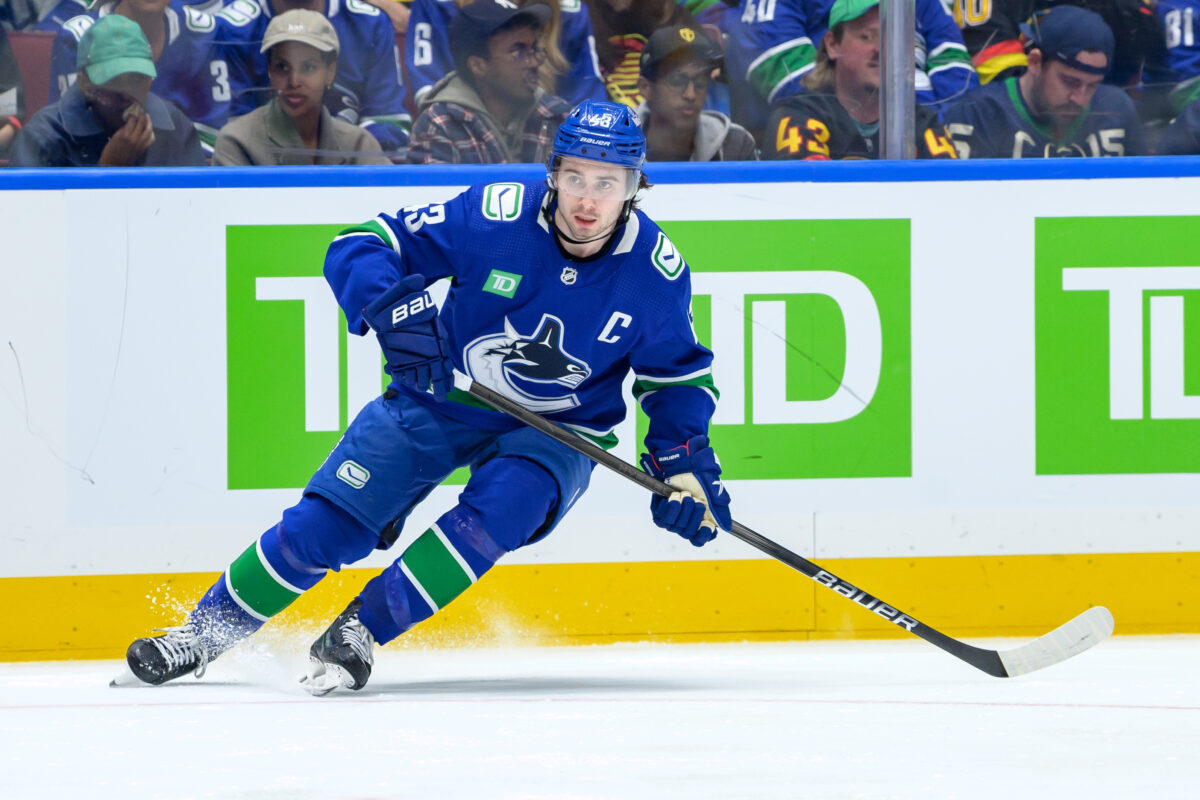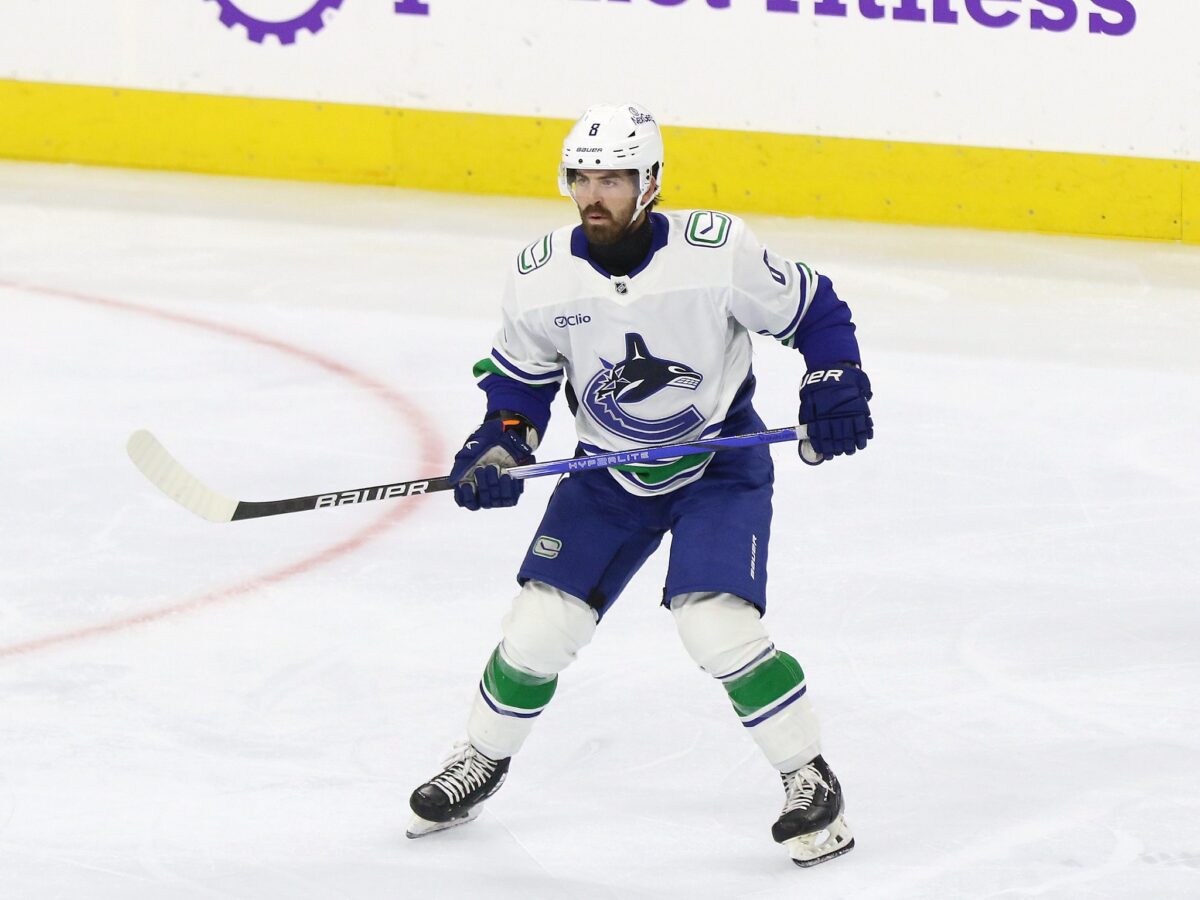The Vancouver Canucks have started the 2024-25 season with a 5-2-3 record after 10 games, two wins fewer than last season. But, thanks to two overtime/shootout losses, they are only two points back of what they had on Nov. 4, 2023, with 13 points instead of 15. All in all, while they are close to the same numbers record-wise as last November, their game isn’t nearly as solid or impressive. Since 10 is a good milestone number, here are a few thoughts about their first 10 games of the season.
Elias Pettersson Well Behind His Pace From Last Season
Elias Pettersson’s slow start this season has been well-documented. He is now in the first year of the $11.6 million average annual value (AAV) contract that he signed last season, and so far, he’s not remotely lived up to it. Yes, it’s only been 10 games, but with only one goal and four points, he is well behind the pace he was on last year. On Nov. 4, 2023, he already had five goals and 19 points – 15 more than what he has right now. He hasn’t had a multi-point game yet, while he had seven before Nov. 4 hit last season. If he continues this slow-trodding pace, he will end up with a career-low eight goals and 33 points, indicative of a third-liner, not the top-six dynamo he’s being paid to be.
Power Play Struggling to Find Its Rhythm
With the amount of talent the Canucks have on their first unit (and second unit for that matter), they should have – at the very least – a good power play. But, it’s been far from that in the early going. Honestly, it’s been tough to watch. They struggle to gain the zone and set up, and when they do, they pass it around way too much, most of the time leading to a turnover and a clear down the ice. The infamous drop pass is somehow still part of the festivities, a holdover from the Jason King/Newell Brown-run power plays of the past, something that should already be ancient news now that Quinn Hughes is on the team.

Hughes should be directed to skate the puck into the zone or make one of his patented crisp first passes to an on-rushing forward instead of stopping at center ice and dropping it back to a forward. This should be the play 95 percent of the time with the drop pass rearing its head very rarely.
In addition to changing how they enter the zone, the Canucks should take a page from the 2000s Detroit Red Wings and adopt the two passes, then shoot mentality. No matter where you are in the zone, if you are the player who is getting the second pass, a shot is the only option. Stop with the passing, and get a shot on goal. As Wayne Gretzky once said, you miss 100 percent of the shots you don’t take.
Penalty Kill Has Improved
The Canucks’ special teams have been like the Batman villain, Two-Face. The power play has looked terrible while the penalty kill has been a bright spot. With the team losing Ian Cole, Nikita Zadorov, and Ilya Mikheyev to free agency and trades, and Dakota Joshua having yet to play a game, there were some worries that it would return to the basement of the league this season. But, that hasn’t been the case so far with Kiefer Sherwood and Danton Heinen excelling as the new additions and Pius Suter stepping into a bigger role. Suter and Teddy Blueger have been the primary duo leading the way with 2:29 and 2:05 of average ice time shorthanded respectively with Sherwood and Heinen picking up the slack with 1:17 and 1:08.
Related: Canucks’ Offseason Additions a Mixed Bag After 10 Games
On defence, while technically Derek Forbort and Noah Juulsen have the most average shorthanded ice time, it’s been Carson Soucy (26:59), Filip Hronek (22:32) and Tyler Myers (21:01) doing most of the heavy lifting. Forbort and Juulsen have not been regulars on the blue line, playing four and three games respectively, so their averages are inflated.
And we shouldn’t forget the goaltender, Kevin Lankinen, who has also contributed to the penalty kill’s strong start. He has only allowed three power play goals on 26 shots for a .885 save percentage (SV%). As a unit, they have led the Canucks to a 83.3 percent kill rate, which is good for 10th in the league. For reference, they finished last season 17th at 79.1 percent.
Kevin Lankinen Canucks’ Early MVP
There was legitimate concern about the goaltending entering training camp with Demko on the shelf with the unique injury he suffered against the Nashville Predators in Game 1 of the 2024 Playoffs and Arturs Silovs and Jiri Patera set to be the tandem for opening night. But then, general manager Patrik Allvin convinced Lankinen to sign a one-year $887,000 contract on Sept. 21. He wasn’t a proven starter, but much more seasoned in the NHL than Silovs and Patera.
Fast forward to Nov. 4, and if you didn’t know any better, you would think the Canucks were not missing Demko. Lankinen has done a phenomenal job filling his skates, currently sporting a 5-0-2 record with a 2.25 goals-against average (GAA), .919 SV% and one shutout. While his stats don’t compare with Demko’s Vezina Trophy-like start last season (5-2-0, 1.79 GAA, .940 SV%, two shutouts), he has played like a starting goaltender, posting better stats than Demko’s 2023-24 full-season work of a 2.45 GAA and .918 SV%. All in all, he’s been arguably the team’s MVP so far, as I don’t think fans want to think about what the Canucks’ record would be if he wasn’t in the crease given Silovs’ 5.00 GAA and .797 SV% in his three starts.
Despite Perceived Struggles Defensively, Canucks Are Elite at Preventing Scoring Chances & High-Danger Chances
There has been a lot of ink spilled on how the Canucks have defended so far this season. There have been breakdowns and problems coverage-wise, but according to the advanced stats taken from Natural Stat Trick, they are elite at limiting scoring chances and high-danger chances at five-on-five. As of this writing, they sit second behind the Minnesota Wild in high-danger chances allowed with 80 and second behind the Carolina Hurricanes in overall scoring chances with 195. They have fallen behind in their goal differential, though, as they currently sit at a minus-3 when they finished with a ridiculous plus-56 last season.
If the Canucks clean up their little miscues defensively and their stars can get back on track offensively, the five-on-five defence so far is a good sign that they will eventually return to the elite two-way team they were in 2023-24.
Conor Garland & Pius Suter Making Noise Offensively
While Pettersson struggles to find his game, Conor Garland and Pius Suter are helping to pick up the slack. Garland has been a beast all season long bringing his trademark edgework, tenacity and work ethic to every shift he jumps over the boards for. He has more than earned his way into the top six alongside the aforementioned Pettersson, and currently has three goals and nine points in 10 games. He has also usurped Jake DeBrusk on the top power play unit and is seeing a career-high 18:07 of average ice time – the most he’s seen since 2020-21 when he logged 17:55 in Arizona.

Suter has also made his presence known recently with four goals in his last five games. While the offence is just being realized, he has been a key part of the improved penalty kill since the beginning of the season and could be making a case to take Arshdeep Bains’ spot next to Pettersson and Garland in the near future. He got time with them against the Sharks on Saturday (Nov. 2) and in 2:57 of five-on-five ice time, Suter scored a goal and the trio generated three scoring chances and controlled the play to the tune of an 87.5 CF%. While that’s a very small sample size, I think it’s good enough to justify trying the combo for at least a game or two.
Brock Boeser Picking Up Where He Left Off
One Canucks star that is not struggling right now is Brock Boeser. Coming off a career-high 40 goals in 2023-24, he is on pace for 41 goals with five goals and nine points in 10 games so far. The blood clot that kept him out of Game 7 against the Edmonton Oilers last season doesn’t seem to be an issue, as it appears he’s turned a corner in his development as a goalscorer. While it’s still early, he is setting himself up for a massive payday when the Canucks eventually re-sign him to a long-term contract.
What Will the Next 10 Games Bring?
The Canucks’ next 10 games are a mixed bag of playoff contenders and rebuilding teams. Here is their schedule:
- @ Anaheim Ducks (Nov. 5)
- @ Los Angeles Kings (Nov. 7)
- vs. Edmonton Oilers (Nov. 9)
- vs. Calgary Flames (Nov. 12)
- vs. New York Islanders (Nov. 14)
- vs. Chicago Blackhawks (Nov. 16)
- vs. Nashville Predators (Nov. 17)
- vs. New York Rangers (Nov. 19)
- @ Ottawa Senators (Nov. 23)
- @ Boston Bruins (Nov. 26)
A six-game homestand headlines the festivities as the Canucks will take up residency at Rogers Arena from Nov. 9-19. Connor Bedard will make his first-ever visit to Vancouver on Nov. 16 as he was injured last season when Chicago visited his hometown on Jan. 22. The homestand could also see the debut of Demko after his long recovery from injury. Could we see him in the back-to-back against the Blackhawks or Predators? Wouldn’t that be something, his return coming against the team that he last saw when he led the Canucks to a 4-2 win on the back of 22 saves.
